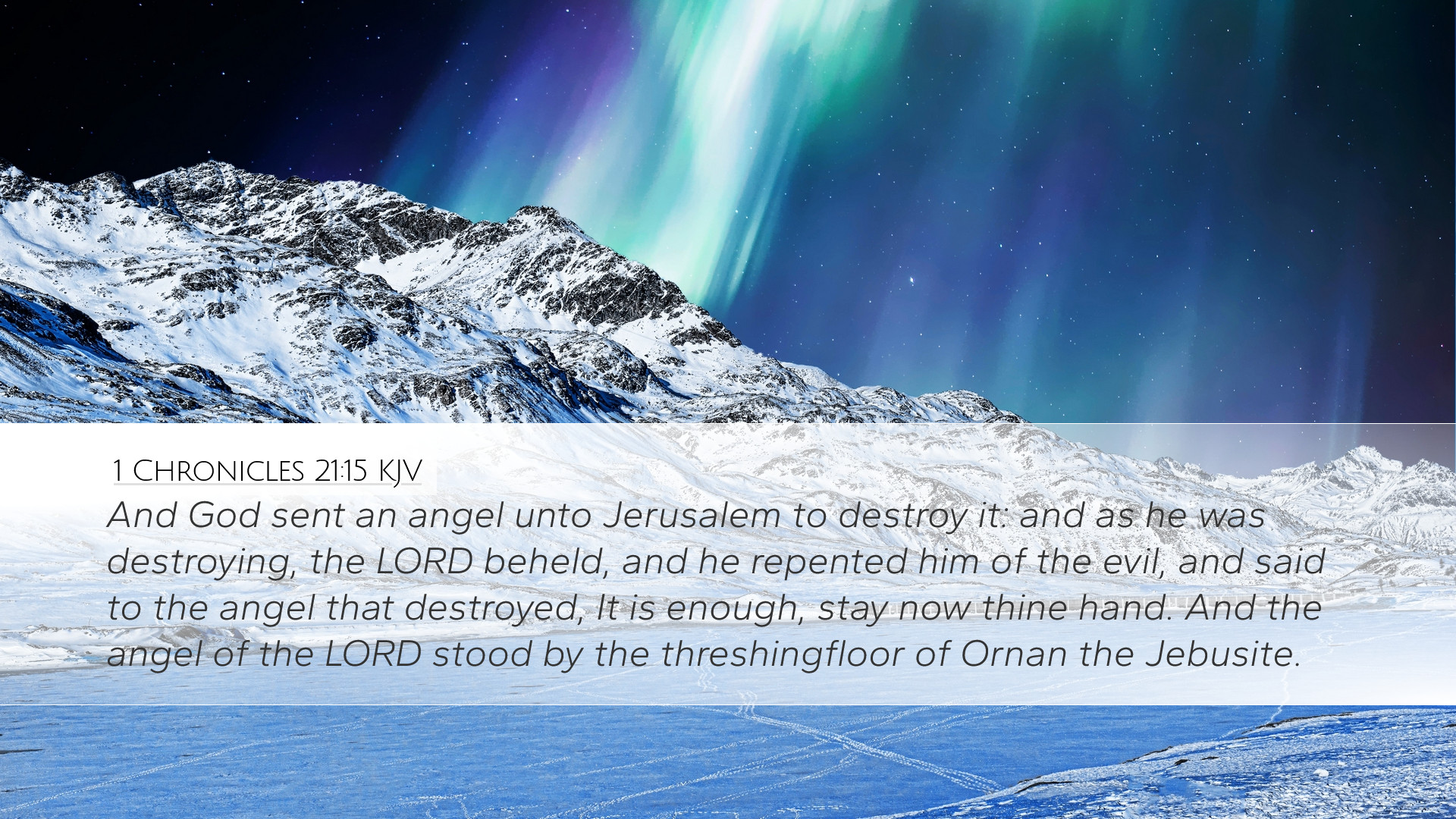Commentary on 1 Chronicles 21:15
Verse: "And God sent an angel unto Jerusalem to destroy it: and as he was about to destroy, the Lord beheld; and he repented him of the evil, and said to the angel that destroyed, It is enough, stay now thine hand. And the angel of the Lord stood by the threshingfloor of Ornan the Jebusite."
Introduction
This passage presents a significant moment in the history of Israel, highlighting themes of sin, judgment, mercy, and divine intervention. The context surrounding King David's census provides vital insight into the implications of his actions and God's response.
Contextual Background
Historical Context: King David conducted a census, which reflected a lack of trust in God and a tendency to rely on his own strength and numbers rather than divine assistance. This act of pride led to severe consequences for Israel.
Theological Significance: The angel's impending destruction serves as a representation of God's judgment, while the mercy called upon by God reflects His nature as both just and forgiving. Understanding this dynamic is crucial for theological study.
Insights from Public Domain Commentaries
Matthew Henry's Commentary
Henry notes that the angel represents God's authority and serves as a conduit for divine judgment. He emphasizes that God’s intention was not merely punitive but aimed at prompting repentance among the people. The fact that God “repented” indicates His readiness to show mercy, illustrating the complexity of divine justice and mercy.
- God's Providence: Henry highlights that God's control over the situation illustrates His providential hand guiding the events for the benefit of His people.
- The Role of the Angel: The angel reflects God's will and serves as an archway between divine intent and human experience, showcasing how God communicates and executes His will among humans.
Albert Barnes' Notes on the Bible
Barnes focuses on the direct actions of God intervening at a crucial moment, demonstrating mercy amidst impending judgment. He suggests that God's “repenting” signifies a change in the approach to the situation, where divine mercy fulfills the promise of preserving the faithful remnant of Israel.
- Moral Implications: Barnes encourages readers to consider the moral implications of leadership and accountability, particularly for those in positions of authority, drawing lessons from David's consequences for his prideful choices.
- Symbolism of the Threshing Floor: The location, Ornan's threshing floor, symbolizes a place of harvest and sacrifice, important for future events in salvation history (considering it is where the temple would later be built).
Adam Clarke's Commentary
Clarke notes the severity of God's judgment as a response to sin, but he underscores the loving and merciful nature of God who intervenes to stop destruction. He reflects on the theological principles of righteousness and justice, providing a foundation for understanding God's repenting as an expression of His mercy.
- Intercession of God: Clarke points out that God's intervention does not imply indecisiveness but rather, a reflection of His character as life-giving and redemptive.
- Implications for Worship: He also considers the implications of this event for worship, grounding future acts of worship in the knowledge of God’s mercy amidst justice.
Theological Reflections
From the combined insights of these commentators, it is clear that 1 Chronicles 21:15 invites readers to deeply engage with the multifaceted attributes of God—mercy amid judgment, love amid righteousness. Pastors and theologians can reflect upon this complexity while teaching about God's nature and His dealings with humanity.
Application for Today's Believers
- Responding to Leadership: Recognize the responsibilities that come with positions of influence and the potential ramifications of prideful or sinful actions.
- Understanding Divine Mercy: Embrace the profound truth that in the midst of judgment, God is always ready to extend compassion and grace.
- The Importance of Repentance: This passage serves as a reminder of the need for personal and communal repentance, as the nature of God’s mercy is unveiled at the moment of sincere contrition.
Conclusion
The episode captured in 1 Chronicles 21:15 profoundly illustrates the balance between divine justice and mercy. The challenge for pastors, students, and scholars is to continually explore these attributes in their theological studies and practical applications. Through understanding this balance, believers can nurture a faith that holds both the awe of God’s justice and the comfort of His mercy.


